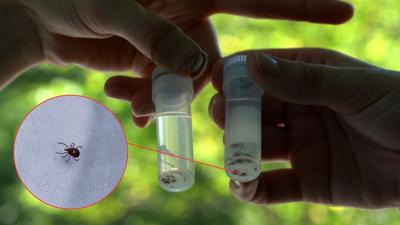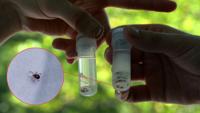SUSSEX COUNTY, DE -- Officials with the Delaware Department of Natural Resources and Environmental Control (DNREC) told WBOC they have seen an increase in ticks across the state this year.
State Tick Biologist Dr. Ashley Kennedy said they have seen an increase in all the common tick species found in Delaware.
"We have seen an increase in tick numbers this year, which honestly surprised me. I would have predicted tick numbers would be a little lower this year 'cause we did have a harder, longer winter than usual," Kennedy said.
Kennedy said she's found some of the highest numbers in Sussex County this year while surveying the state. She said those numbers are expected to increase throughout the summer.
"It seems the further South you go in Delaware, the higher the tick numbers get," Kennedy said. "They do really seem to thrive here below the canal, and we've especially seen high numbers in the lone star tick."
According to Kennedy, an increase in tick numbers also means an increased risk of contracting tick-associated diseases in people and pets. Kennedy said Delaware is in the top ten states for Lyme disease, and in the top five states for ehrlichiosis, a flu-like illness from ticks. Delaware is also number two for alpha-gal syndrome, which causes an allergy to certain meats and animal products, according to Kennedy.
"I think a lot of people think of tick habitat as being deep in the woods, but what we're actually seeing in Delaware is that many different habitats can support ticks," Kennedy said. "Make sure you're doing frequent tick checks and removing them as soon as you spot them, ideally before they have a chance to bite."
Kennedy advised WBOC about other ways that people can stay safe throughout the peak tick season.
"You can tuck your pants into your socks, or tuck your shirt into your pants. Anything that makes it harder for ticks to find your skin will help you," Kennedy said. "There's also a whole variety of products that are effective as tick repellents. Products that use DEET are highly effective, so look for that as an active ingredient."
Those interested in more information on how to stay safe as peak season arrives can visit the state of Delaware's website.
According to the state tick biologist, tick populations are difficult to control.
"We don't have a lot of great options in our toolbox," Kennedy said. "There are products that are effective at killing ticks, but unfortunately they are not very specific to ticks. So, they could take out a lot of collateral damage, like our pollinators and other insects."
Those interested in more information on ticks in Delaware, or those who wish to report a tick sighting, are encouraged to go to DNREC's website. Kennedy also said that those who are bitten by ticks and start exhibiting symptoms should contact their medical provider.


